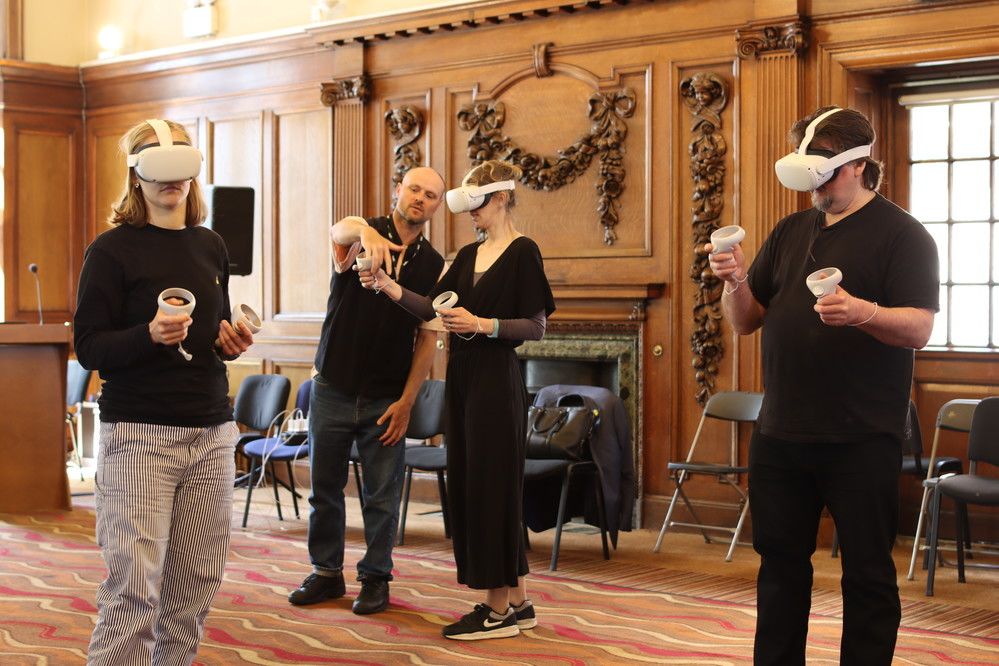The Accelerate project in action: teaching arts and design subjects remotely using VR technologies

- Written byAnnika Loebig
- Published date 15 July 2022

In June 2022, the 6 European partners involved in Accelerate came together to test how virtual reality (VR) technologies could be used to teach creative practice-based subjects remotely.
The Erasmus+ Strategic Partnership started in the summer of 2021, bringing together lecturers, educational researchers and learning technologists from the UK, Ireland, Poland and Ukraine to reflect on the impact of COVID-19 in arts universities across Europe. As many were rethinking different ways of working, teaching and learning, the Accelerate partners wanted to explore new possibilities for pedagogy and digital innovation in a way that’s accessible and applicable to students on arts and design courses.
“Coming off the back of the pandemic, we really had to shift our thinking in terms of how we deliver content to students. It has created a unique opportunity to push forward new ways of teaching and learning,” Matt Hawkins, Senior Lecturer on the Illustration Programme at Camberwell College of Arts, tells us.
Matt was brought in to develop case studies for the project, which involves delivering workshops and looking at how the technology might be upscaled and applied to academic programmes. He led on the 3-day workshop hosted at Chelsea and Camberwell, sharing his knowledge and experience with the partners on how to use VR tools for traditional creative disciplines like drawing and illustration.
Using VR in arts and design education
Attendees got a chance to familiarise themselves with the different tools, ecosystems and platforms using Oculus VR headsets and Gravity Sketch software.
“The most exciting takeaway was the usability of the new technologies to produce a genuinely useful, collaborative teaching space,” said Julian King, Programme Chair for 3D Design, Model Making and Digital Art at Dún Laoghaire Institute of Art, Design and Technology in Ireland. “It's really interesting to get your hands on the tools to experiment with them, and to think and plan how we could use them in a real-world teaching environment.”
“The experience has been very positive, and it has helped us to see that we have a lot of commonalities between our universities. In the context of the digital era, this relationship we’re building between all the partners is crucial for us,” expressed Natalia Hatezh, Assistant Professor for Decorative, Applied and Fine Art at Chernivtsi National University in Ukraine.
In the final phase of Accelerate, the project partners will deliver more training and work with students to continue exploring the challenges around accessibility and usability of VR tools.
"We're going to take what we've been learning on our training and put it into the classroom. We’ll be talking to our students and staff to learn about their thoughts on using VR tools, and we’ll be drawing from these experiences to develop a suite of resources that will be publicly available for universities across Europe,” Ian Gadd, Project Coordinator for Accelerate and Head of Development for European Projects at Bath Spa University, explains.
Accessibility and inclusivity will remain at the heart of the project, as Chris Follows, Emerging Technologies Manager and UAL co-project lead for Accelerate, tells us: “We need to acknowledge that a lot of learning and teaching is going to be delivered in this hybrid form, which is why the accessibility aspects around VR technologies is so important in this project. We need to tailor whatever training we do in the future to make sure no one gets excluded by the technology.”
Accelerate is an Erasmus+ Strategic Partnership led by Bath Spa University in collaboration with University of the Arts London, Dún Laoghaire Institute of Art, Design and Technology in Ireland, SWPS University of Social Sciences and Humanities in Poland, and Sumy State University and Chernivtsi National University in Ukraine. The project is part of Partnerships for Digital Education Readiness, a funded programme launched by the European Commission for initiatives responding to the digital challenges raised by the Covid-19 pandemic.
The UAL team working on Accelerate is jointly led by Chris Follows, Emerging Technologies Manager, and Mick Grierson, Professor and Research Leader at Creative Computing Institute. Academics from Performance and Illustration courses at Camberwell, Chelsea and Wimbledon Colleges of Arts also play a key role in this project, exploring the boundaries of immersive tech and how they can be applied to teach creative disciplines.